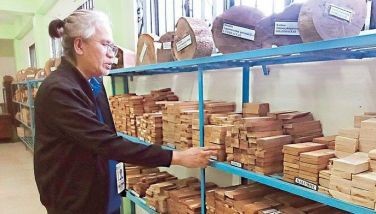Teodoro urges Mindanao residents to stop culture of violence
MANILA, Philippines - Lakas-Kampi-CMD presidential candidate Gilberto Teodoro Jr. yesterday urged Mindanao residents to stop the culture of violence that has been hampering development in the region and instead promote lasting peace.
Teodoro was referring to the practice of “rido” or blood debt, which he said stands in the way of progress in Mindanao.
The rido culture, a ritual killing anchored on revenge, is most common among Muslim clans as well as other tribes in the region.
“If we would persist in implementing the ‘eye for an eye’ for every offense committed against us, then the whole world will go blind,” Teodoro told local political and tribal leaders in Mindanao in a recent dialogue.
He said that while he respects Muslim traditions, there are some practices that spawn hatred and murder among members of the religion.
“If we can get our Muslim brothers to forget about this senseless tradition of rido and get them to stop carrying guns in their culture, I believe that Mindanao will be able to reach its maximum economic potential,” the presidential aspirant said.
He said Mindanao has vast arable land to ensure the country’s food security.
Teodoro said instead of killing each other, Muslims should establish a culture of peace to achieve economic development.
He urged Mindanao’s political and religious leaders to work together to stop violence and promote love and respect for others.
Meanwhile, two Lakas-Kampi-CMD senatorial candidates urged the national and local governments to implement cash-for-work programs to help ordinary farmers affected by the El Niño phenomenon.
Senate bets broadcaster Rey Langit and League of Municipalities of the Philippines (LMP) president Ramon Guico said the adverse effects of the long dry spell, particularly in Northern and Central Luzon, have rendered most ordinary farmers jobless with nothing to feed their families.
“People are starving in El Niño-affected areas and I don’t think we should just sit down and do nothing,” Langit said.
Langit said cash-for-work in all government agricultural projects, repair of classrooms and schools or other jobs that would involve fixing government facilities in the affected areas could be implemented.
The private sector, he added, should also be encouraged to support the cash-for-work programs by prioritizing the employment of affected farmers in some temporary jobs.
Guico, who is also the mayor of Binalonan, Pangasinan, said the food-for-work program would provide rice to feed the families of affected farmers instead of giving them cash.
He said the funds could come from the local calamity fund of each town or province or directly come from the government through the Department of Social Welfare and Development.
“If and when implemented, there should be some safeguards for the program so it won’t be exploited by the incumbent officials seeking reelection or running for other elective posts,” Guico said.
“Among them is coordination with the Commission on Elections and allowing trusted non-government organizations to supervise the cash-for-work or food-for-work programs,” he added.
- Latest
- Trending



























